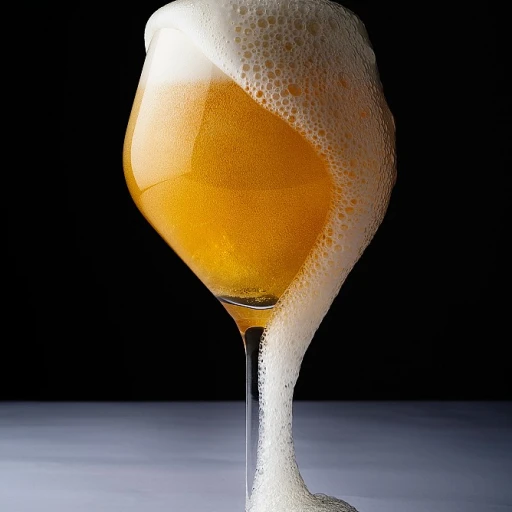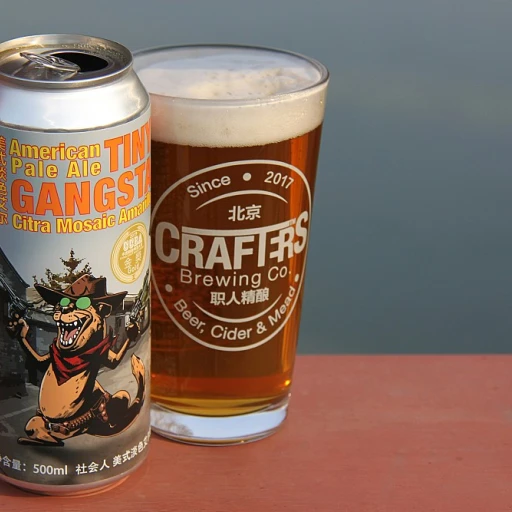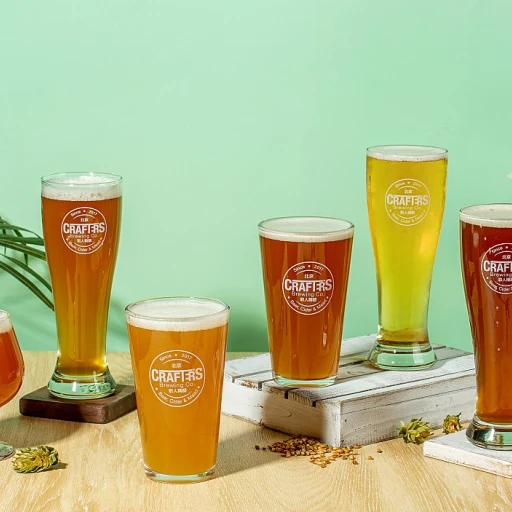The rise of gluten-free beers
A growing shift in beer choices
It’s fascinating to see how the beer scene is evolving. Consumers are constantly seeking options that cater to their dietary restrictions and preferences. One of the most notable changes has been the rise in popularity of gluten-free beers. For individuals with celiac disease or gluten sensitivity, traditional beers made from wheat, barley, and rye are off-limits.
This newfound love for gluten-free options isn't just a fad. According to a report by Grand View Research, the market for global gluten-free foods and beverages was valued at $4.48 billion in 2016 and is projected to reach $7.59 billion by 2024. That's an impressive growth rate fueled by not just medical needs, but also by a more health-conscious consumer base.
Changing consumer needs
Consumers want to enjoy their beloved beer without compromising their health. Anheuser-Busch realized this shift early on and responded with a stellar product. Redbridge gluten-free beer, brewed from sorghum, a naturally gluten-free grain, was born out of necessity and innovation. It's a full-bodied lager that’s moderately hopped, offering a well-balanced taste profile without the gluten.
Statistics shared by the National Institute of Allergy and Infectious Diseases indicate that approximately 1% of the U.S. population has celiac disease. That may seem modest, but when translated into actual figures, it means nearly 3 million people benefit from gluten-free products.
Business strategies and market adaptation
The realization that a significant number of beer drinkers were being left out pushed breweries to innovate. Redbridge isn't just a random product; it’s a thought-out response to an evident need. Anheuser-Busch strategically aimed for authenticity and quality. Their focus was not just on making a gluten-free beer but ensuring it matched the taste expectations set by traditional beers. With Redbridge, they didn't settle for simply removing gluten; they created a rich, full-bodied lager brewed to compete with standard lagers on every front.
The story behind Redbridge
The legacy of Anheuser-Busch in gluten-free brewing
When we examine the drive behind Redbridge gluten free beer, we must acknowledge the commitment of Anheuser-Busch. Founded in 1852, Anheuser-Busch, headquartered in St. Louis, Missouri, has a longstanding tradition of brewing exceptional beers. Known predominantly for household names like Bud Light and Busch, this brewing giant recognized an unmet need in the market and dived into the realm of gluten-free beers.
Redbridge, launched in 2006, stands as a pioneering effort by Anheuser-Busch. They sought to craft a beer that caters specifically to individuals with celiac disease and those adhering to a gluten-free diet. The intent wasn't to merely tap into a niche; it was a commitment to offer quality and flavor that stands shoulder to shoulder with traditional brews.
A visionary initiative
Redbridge is brewed using sorghum, a gluten-free grain, making it a suitable option for those with gluten sensitivities. This decision to employ sorghum showcases Anheuser-Busch's innovative approach. Sorghum is not a typical ingredient in mainstream beer brewing, which traditionally relies on wheat and barley. This deviation is a testament to Anheuser-Busch's ingenuity in providing options for the gluten-free community without compromising on taste.
Market demand and consumer response
Since its launch, Redbridge gluten-free beer has soared in popularity. According to a study by the National Foundation for Celiac Awareness, the prevalence of celiac disease in the United States is about 1 in 133 people. This significant number translates to an essential market segment that was being overlooked before gluten-free beers like Redbridge emerged. The beer industry’s adaptation to include gluten-free options has been well-received, with consumers appreciating the rich, full-bodied flavor Redbridge offers.
Notably, Redbridge isn't just for those diagnosed with celiac disease. Many consumers who choose a gluten-free lifestyle for health or dietary reasons find solace in sipping a moderately hopped, well-balanced gluten-free lager. According to data from Statista, the gluten-free beer market in the U.S. has seen steady growth, with Redbridge being a major player contributing to this rise.
Redbridge's journey from inception to becoming a household name in gluten-free beers showcases the importance of innovation, consumer awareness, and a dedication to quality. The legacy of Anheuser-Busch, combined with their vision for inclusive brewing, has positioned Redbridge as not just a beer, but a triumph for those who once thought certain pleasures were unreachable.
Want to dive deeper into other beer innovations? Check out this immersive flavor journey for more insights.
The unique brewing process of Redbridge
Brewing Redbridge: the process that sets it apart
When talking about gluten-free beers, the brewing process is crucial. Redbridge stands out due to its unique use of sorghum instead of the traditional barley or wheat. The journey starts with Anheuser-Busch's meticulous selection of sorghum, an ancient grain that thrives even in dry conditions, offering a versatile alternative for brewing.
Anheuser-Busch, the behemoth behind Redbridge, has been at the forefront of crafting gluten-free beer options. They ensure all processing equipment is thoroughly cleaned to prevent gluten cross-contamination. Their commitment doesn’t stop there; frequent testing is undertaken to ensure the gluten content is below the 20 ppm threshold, critical for those with celiac disease (Celiac Disease Foundation).
The ingredients that make it special
Sorghum, the star ingredient in Redbridge, contains no gluten, making it safe for individuals with gluten sensitivity. It provides a slightly sweet flavor, contributing to the well-balanced and moderately hopped taste that Redbridge is known for. The addition of imported hallertau and domestic cascade hops adds a layer of complexity to the beer's flavor profile.
While many traditional beers rely on wheat, Redbridge prides itself on staying true to its gluten-free commitment. The sorghum malt used in Redbridge also lends to its rich, full-bodied nature, making it a strong contender against more conventional lagers.
Attention to detail
No stone is left unturned in the pursuit of maintaining Redbridge's gluten-free status. From the use of dedicated equipment to rigorous testing protocols, Anheuser-Busch ensures every batch of Redbridge meets the highest standards. This meticulous process gives consumers the confidence they need when selecting this beer.
For a detailed guide on choosing the right glassware for lagers like Redbridge, check out this resource. Proper glassware can enhance the tasting experience, letting you fully appreciate the nuanced flavors of Redbridge.
Taste and flavor profile
The taste that sets Redbridge apart
When it comes to Redbridge gluten free beer, the taste is where the magic happens. This isn’t just another gluten-free lager; it’s a rich, full-bodied experience that surprises even the most seasoned beer enthusiasts. Redbridge is brewed with sorghum, a grain that’s naturally free of gluten, which gives it a unique flavor profile that's both well-balanced and moderately hopped. The first sip of Redbridge hits you with a moderately hopped taste, thanks to the blend of imported Hallertau and domestic Cascade hops. It’s not overly bitter, but just enough to remind you that you’re drinking a quality lager. The sorghum used in the brewing process brings a slightly sweet, almost nutty undertone that lingers on the palate, making it distinct from your typical wheat-based beers. Unlike some other gluten-free beers that might feel watered down or lacking in depth, Redbridge offers a full-bodied lager experience. It’s rich and satisfying, with a flavor that’s both refreshing and complex. The well-balanced nature of this brew means it pairs well with a variety of foods, from grilled meats to spicy dishes, making it a versatile choice for any occasion. For those with celiac disease or gluten sensitivities, Redbridge provides a delicious alternative without compromising on taste. It’s a beer that invites you to share a drink with friends, regardless of dietary restrictions. And for those who are used to the likes of Bud Light or other Anheuser-Busch offerings, Redbridge offers a familiar yet distinct experience that wouldn’t surprise you with its quality. In terms of aroma, Redbridge carries a subtle, floral scent, a nod to the hops used in its creation. It’s a beer that doesn’t just taste good; it smells inviting too, enhancing the overall drinking experience. Whether you’re enjoying a quiet evening at home or sharing a round with friends, Redbridge gluten free beer is a testament to how far gluten-free brewing has come. It’s not just about being gluten-free; it’s about being a great beer in its own right.Market impact and consumer reception
Market impact and consumer reception
Since its introduction, Redbridge has created ripples in the gluten-free beer segment. With a noticeable lack of gluten-free options among mainstream beer brands, Anheuser-Busch's move to launch Redbridge filled a glaring void. The growth in the popularity of gluten-free diets, often associated with celiac disease and gluten sensitivity, contributed significantly to its immediate acceptance.
According to a 2022 study by the Gluten Intolerance Group, around 1 in 100 people worldwide are affected by celiac disease. The study also highlighted that the number of people adopting gluten-free diets despite not being diagnosed with celiac disease had increased by roughly 30% in the last decade. This trend has driven up the demand for gluten-free products, including beers.
Redbridge has been frequently cited as a go-to option for gluten-free beer enthusiasts, with these reviews emphasizing its rich, full-bodied lager brewed from sorghum. Its moderately hopped taste and well-balanced flavors have earned it a prominent place on the shelves of beer retailers. It's particularly popular among those who miss the craft beer experience without having to compromise due to dietary restrictions.
The Anheuser-Busch flagship product managed to capture approximately 20% of the gluten-free beer market within its first few years, showcasing its relevance in this niche sector. Additionally, a 2021 market report from BeerInsights Magazine showed that Redbridge has maintained a steady growth rate, with an annual increase in sales by approximately 5%, reflecting its positive reception.
One particular reason consumers resonate with Redbridge is the brand's commitment to authenticity and quality. As beer reviewer Jay Brooks from Brookston Beer Bulletin noted, “It's not just a substitute; it’s a standout in its own right.” This sentiment is echoed by numerous user reviews on beer enthusiast forums and social media.
Despite its success, the gluten-free beer market continues to face challenges. The higher production costs of gluten-free beers, compared to regular beers, often result in higher retail prices, which can be a barrier for some consumers. Additionally, debates surrounding the taste of gluten-free beers in comparison to traditional barley-based beers persist. Nevertheless, brands like Redbridge prove that with careful brewing processes and quality ingredients, gluten-free beers can stand toe-to-toe with their gluten-filled counterparts.
Looking ahead, the rise in health and dietary consciousness suggests that the demand for gluten-free beers will only climb higher. Experts predict a bright future for Redbridge, bolstered by the growing anecdotal and empirical support for gluten-free diets and products. While the competition in the gluten-free beer market is set to intensify, Redbridge's established market presence gives it a definitive edge.
Future trends in gluten-free brewing
Exploring Future Trends in Gluten-Free Brewing
The world of gluten-free brewing is growing and evolving, propelled by an increasing awareness and demand from people with celiac disease or those simply seeking a gluten-free lifestyle. This surge in popularity is not only a shift in dietary habits but a broadening horizon for breweries globally. Let's explore some exciting developments on the horizon.
Innovations in Ingredients
The quest for the perfect gluten-free beer often hinges on finding the right ingredients. Traditionally, barley and wheat have been the grains of choice in brewing, but they are off-limits for those with gluten sensitivities or celiac disease. Sorghum, rice, millet, and buckwheat have emerged as the top alternatives. Each of these grains brings a unique taste and character to the brew, expanding the palette of flavors available to gluten-free beer enthusiasts. Research and experimentation with these grains are anticipated to produce even more exciting variations in the future.
Advanced Brewing Techniques
Beer manufacturers like Anheuser-Busch, the masterminds behind Redbridge Gluten Free Beer, are continuously refining their brewing methods. This striving for perfection involves adjusting fermentation processes and exploring enzymatic treatments. Technologies to remove gluten from traditional grains while maintaining their taste are gaining traction, promising even more authentic beer experiences minus the gluten.
Consumer Feedback and Preferences
The power of consumer feedback in shaping future beer trends can't be overstated. Celiac disease sufferers and those adhering to gluten-free diets are vocal about their likes, dislikes, and desired improvements. Online reviews, social media, and direct feedback mechanisms serve as valuable sources of insights for breweries. Expect future gluten-free beers to become even more aligned with consumer tastes.
Sustainability and Ethical Sourcing
Modern consumers are increasingly conscious of sustainability and ethical sourcing. This trend is reflecting on the gluten-free beer market as well. Brewers are exploring sustainable farming practices for alternative grains, reducing carbon footprints, and employing environmentally friendly packaging. Brands that prioritize these practices are likely to win customer loyalty.
Greater Variety and Availability
Gone are the days when gluten-free drinkers had to settle for a limited selection. The future promises a more incredible variety of gluten-free beer types—IPAs, stouts, lagers, and more. With better distribution channels and higher demand, finding a well-balanced, moderately hopped gluten-free beer like Redbridge will become even easier for consumers worldwide.
Redbridge Gluten Free Beer has already made significant strides in appealing to a broad audience. As the brewing industry moves forward, it's poised to offer even richer, more diverse options that cater to evolving preferences while maintaining the rich, full-bodied experience that beer lovers crave.












